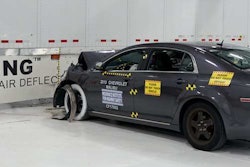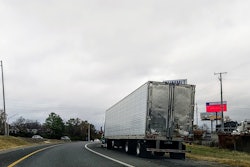Roadcheck, the Commercial Vehicle Safety Alliance's annual enforcement blitz, falls on May 16-18. Though as usual there have been some slight tweaks to the out-of-service criteria for drivers and trucks this year, a core piece of wisdom remains vital for owner-operators: Don't give them a reason to inspect you, and if you do get pulled in, know how to play it right.
In a perfect world, you might say, an all-hands-on-deck inspection event like Roadcheck, aimed at education as much as it is enforcement, might pull in a representative sampling of trucks and operators for inspection.
Yet In the real world, if your truck looks a little unkempt, or your attitude is a little gruff, inspectors like as will see it that a red flag increasing your chance of a real delay for a full Level 1 inspection, according to Jeremy Disbrow, the Commercial Vehicle Safety Alliance's roadside inspection specialist. Disbrow was speaking Thursday's as part of a webinar on preventative maintenance practices to beat the inspection blitz, hosted by Overdrive sister publication CCJ.
How to avoid an inspection during Roadcheck
For the owner-operator with places to be and clean inspections already on their record, sometimes Roadcheck is more of an obstacle to be avoided than a challenge to engage with.

"When I’m selecting a vehicle to inspect, I don’t want to waste time on vehicles that are going to be clean with no violations," Disbrow said. He joined CVSA last year after 25 years conducting plenty of inspections himself in Arizona. "It starts from when you're sitting in the median, watching traffic go by." Lights out, reflective tape missing -- "That’s going to attract my attention. When you notice little violations that are easy to fix not being fixed, it's usually indicative of bigger violations."
When an officer sees those little misses, they think either an owner "doesn't care and isn't doing a pretrip or hasn't been educated on how to do a pretrip," Disbrow added. Or, in the case of company drivers, "that the carrier knows about it because the driver reported it and the carrier isn't fixing it."
Furthermore, neither drivers or inspectors are robots, and attitude means a lot in these interactions.
"Driver attitude and inspector attitude goes a long way," said Disbrow. "The inital tone in the first 30 seconds sets the tone for the entire inspection."
[Related: POLL: Are you Roadcheck-ready?]
That is to say, even if you're having a bad day, it's nice to be nice up-front in these situations. Recall that an operator's suspicious or nervous behavior has led to searches, even drug busts, before.
"We’re not the courtesy police, but being patient and polite goes a long way," said Disbrow. Also, though some owner-operators might beg to differ, he pointed out those educational aspects of the CVSA blitz mean Roadcheck seldom has an adversarial feel to it. The same can be said about inspections, generally. Often, it comes down to both inspectors and drivers puzzling over a common enemy like some confusing ELD readout.
"The animosity or 'us against them' feeling -- it's usually entirely the opposite," he said. "Most drivers are pretty courteous and friendly and so are troopers. That tells me the driver takes pride in their work and has their things together and organized. It just makes the process go quicker."
If anything, said Disbrow, with many drivers "on the road for weeks" and "lonely," he's often the one who has to shut down a lively, even fun conversation after an hour or so.
Treat it as tacit confirmation that if your truck looks clean and you act like you have nothing to worry about at Roadcheck, you have a much better shot at getting through without a delay.
Alternatively, if you're a new carrier and want an inspection, Disbrow said to call law enforcement in the state you primarily operate in. Some inspectors will be a little unwilling to inspect a truck that wants a sticker, as its condition when offered up to inspectors might differ from its condition when it's been on the road for a while. But, ultimately they'll make that determination on a case-by-case basis. Last year at Roadcheck, Overdrive witnessed an owner-op do just that and pass with flying colors.
[Related: On the ground with inspectors, owner-ops on Roadcheck Day 1]
What inspectors will be looking for May 16-18
This will likely be old hat to longtime owners, but Disbrow pointed to the CVSA's website, where drivers can can download documents on the entire inspection procedure and what they're looking for.
Of course, with cargo securement a main focus of this year's Roadcheck, pretrip inspection takes on a new importance.
"If you aren't getting out and getting dirty, you're probably not doing it as thoroughly as you need to be," Disbrow said of pretrip inspections. "I want see fingers turning bolts and making sure things are tight. You’re probably going to get greasy."
Securement issues break down into roughly three categories, some of which have to do with drivers correctly inspecting the truck before, after, and during a trip.
- The cargo was never properly secured, with the driver not using enough tiedowns or not making sure the tiedowns function properly.
- "Drivers, once they secure the load," Disbrow said, "just take off on the 1,000 mile journey or whatever and never recheck" the securement." Bumpy roads, acceleration, deceleration along the journey and "cargo tends to shift and tiedowns become loose," he said, stressing that the actual rule is to stop 50 miles into the trip and then check again every three hours or 150 miles along the journey.
- Issues inside sealed trailers -- Disbrow empathized with operators on such loads -- too often, the trailer is sealed before they even get to the pickup area. Sometimes operators aren't even allowed on the dock to check the load. In these cases, however, the load securement responsibility still falls on the driver, so the driver needs to trust the shipper.
This Roadcheck's other focus is ABS brake systems, which Disbrow called "one of the easiest things to check," on the truck. This, of course, is where preventive maintenance can save drivers the trouble and shock of not seeing that ABS light cycle on when the key turns.
DataQs: What to do if you're issued a violation in error
Most longtime independent carriers know about the DataQs system for disputing violations, with all its flaws, but Disbrow gave some strategies for keeping points off your records in the first place without making the inspection needlessly contentious.
Because violations don't go to court, DataQs is a carrier's or driver's only way to "contest or rebut" what an inspector reports. Importantly, the regs are confusing. Each inspector may have their own interpretation of the regs as written, and drivers may have different interpretations.
According to Disbrow, if an inspector cites a violation, it's perfectly reasonable for the driver to ask them to point out just where in the green book what they're citing is, and how they interpret it, even to offer their own interpretations.
"If an inspector interpreted a reg incorrectly and you know the regs, you can say 'per inspection bulletin XYZ it says this,' and the inspector will look and hopefully weigh that in light of documents," he said, perhaps keeping that violation from ever going on the record.
But, in the case such a violation does go on the record, dispute it when you're able and have firm documentation. Just but don't abuse the system.
[Related: How to mount an effective DataQs challenge]
"You see this sometimes," Disbrow said, thinking back to his time handling DataQs as a state officer. "There are some carriers where if there's 10 violations, they're going to contest all 10 with no supporting documents," which he said "wastes time bogging down" the system. "Quite frankly," that carrier is "going to start getting a reputation for it, and it might not work in your favor down the road."
A good strategy around disputing violations is to use timestamped photographic evidence, but beware, the camera now points both ways.
"If you have photo or video from an in-dash camera, those are hugely beneficial to overturn plenty of DataQs, but keep in mind ... most officers now have body cameras," he said, possibly producing their own counter-evidence. "Also, the sooner you can take the photo, the better. A DataQ review won't look as kindly on a photo you took two weeks later," or one without a timestamp, as one that's clearly at the scene of the inspection.
Ultimately, the DataQs systems are run by the states, with "every state program a little different" in approach, he said, but most aim to be forgiving when confronted with proper documentation.
"I was always happy to overturn violations, I don't want to see incorrect violations," he said.










